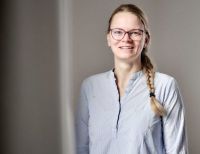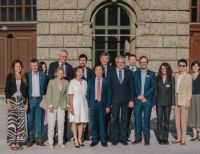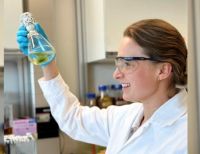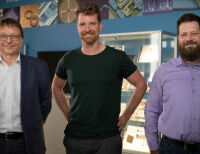Ever since he can remember, Günther Dissertori, Professor for Particle Physics and newly elected Rector of ETH, has wanted to understand the inner workings, the very core of things. He was initially also interested in genetic engineering before deciding to become a physicist, although at first he was unsure whether he had overestimated his ability. “I was convinced that only the crème de la crème studied physics,” he recalls. He didn’t consider himself part of this elite.
The son of a housewife and a travelling salesman, Dissertori grew up in Algund, a village near Meran in South Tyrol. He spent many a summer day on his grandparents’ farm and was the first in his immediate circle to study and pursue an academic career. This probably left its mark on him, he says: “I try not to take anything for granted.” Pride often comes before a fall, he believes, explaining, “It’s better to work gradually towards success and take satisfaction in achieving each goal.” He has invariably set his sights high, however. His childhood dream was to become an astronaut. Having read everything on aerospace he could get his hands on, as a student he passed the first rounds of the selection process. It wasn’t enough, so he stayed on the ground and soon excelled in physics instead.
The Higgs boson
In 1994, a scholarship from the University of Innsbruck took him to CERN in Geneva as a doctoral student, where he obtained his doctorate in 1997. In 2001, at the age of 31, he became an assistant professor at ETH Zurich. “I really thought I was almost too young for that, so I was thrilled to receive great encouragement and support from those around me.” From then on, he travelled back and forth between his posts at CERN in Geneva and ETH in Zurich, where he was made a full professor in 2007.
At CERN, he helped set up the CMS experiment on the Large Hadron Collider. The experiment confirmed the existence of the Higgs boson, thereby supporting the theory put forward by Peter Higgs, Robert Brout and François Englert. In recognition of their contribution, Higgs and Englert were awarded the 2013 Nobel Prize in Physics. By joining forces with ETH physicists Christophorus Grab, Felicitas Pauss and Rainer Wallny, Dissertori had helped prepare the ground.
As an experimental physicist, he says, he has always placed emphasis on liaising closely with theorists. This collaboration calls for a profound understanding of both disciplines. To quote Dissertori: “Some of the science involved is so specialised that even finding a common language and understanding is challenging.” Moreover, he has always enjoyed collaborating in large groups, as is usual in particle physics.
Would I understand it?
Dissertori is passionate about teaching, too. The same aspect of physics and the classroom, namely making complex subject matters as simple as possible, is what fascinates him. Explaining and understanding are two sides of the same coin, he says: “Often you’re quite sure that you’ve understood something. But it’s not until I try and explain it that I realise whether I have truly grasped the concept or not.”
What’s more, you have to tailor your explanation to your audience. “I always ask myself whether I would truly understand what I’m trying to convey if I were in their shoes.” If not, then he’s not satisfied with his efforts.
To honour his exceptional teaching in the department, the students have nominated him for the Golden Owl – not once but four times – and he has also received the Credit Suisse Award for Best Teaching at ETH. His classes are popular, but Dissertori can’t just let this accolade stand. To his mind, popularity should not be automatically put on the same level as quality.
Just what constitutes effective teaching is high on his agenda as rector. This question may have been answered implicitly for many, but he’s not satisfied yet.
The daunting tasks of growth
When asked what projects he hopes to implement, he consequently also mentions his plan to overhaul how teaching is evaluated. In his opinion, carrying out surveys among students is too one-sided; he would welcome other points of view in this regard, such as feedback from colleagues. Although scientists are accustomed to having their research peer reviewed, they are far more hesitant when it comes to their classroom skills. He hopes to overcome their reluctance.
One of the greatest challenges he faces as rector are the ever-increasing numbers of students, especially since the staffing level is unlikely to keep pace over the next few years. It’s a daunting task as the solution does not rest with ETH alone. Discussions on potential measures are inevitable if ETH is to uphold the quality of teaching, perhaps by tightening the admission criteria for Master’s degrees.
He also has every respect for tasks such as those faced by Rector Sarah Springman, her team and the Executive Board during the COVID-19 crisis: tasks that crop up unexpectedly, calling for quick decisions in the absence of any reliable data.
Rethinking in-person teaching
As rector, his first task will be to help teaching activities recover after the COVID-19 crisis. To this end, Sarah Springman is holding several workshops and strategy meetings with the lecturers and students this year, thereby laying the initial groundwork. As the Director of Studies for the Department of Physics and future rector, Dissertori is also involved.
“Over the last year, we have realised just how important and stimulating classroom teaching is. As lecturers, we must ask ourselves exactly what sets on-campus classes apart and how to reap the most benefit from in-person teaching,” he says. Needless to say, depending on the subject field and course, the answers will be very different. The question should nonetheless still be debated.
He is therefore looking forward to the discussions, to new encounters, ideas and other perspectives. Of course, he is also eager to “help shape the future direction of ETH” and accept the responsibility. But most of all, he says with perfect sincerity, he is looking forward to the people.
















